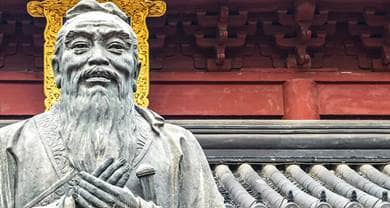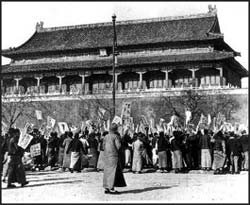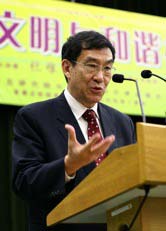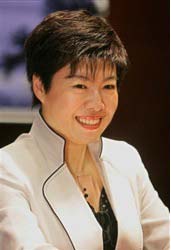- Trending:
- Pope Leo Xiv
- |
- Israel
- |
- Trump
- |
- Social Justice
- |
- Peace
- |
- Love

RELIGION LIBRARY
Confucianism
Modern Age
Confucianism has been both lauded and condemned in the modern age. Confucianism, along with Taoism and Buddhism, has been blamed for China's inability to compete with the West during the 19th and 20th centuries. Confucianism has also been praised as the key to China's unique cultural heritage and strong social order. The post-colonial period of Confucianism's history (from the fall of the Qing dynasty in 1911 to the present) has been shaped by the disappearance of Confucianism's imperial sponsorship, the impact of Western powers, and the reform movement known as New Confucianism.
 With the arrival of the expansive and aggressive Western powers during the late 19th and early 20th centuries, the Confucian tradition, like every other aspect of Chinese culture, was disrupted. On May 4, 1919, Chinese university students participated in massive public demonstrations in Beijing's Tiananmen Square. They were protesting a provision of the Treaty of Versailles (the agreement that ended World War I), according to which the defeated Germany's colonial possessions in China were not restored to Chinese control, but instead were awarded to Japan, one of the victorious Allied powers. These possessions included the Shandong peninsula, the site of Kongzi's birthplace and the historic heart of the Confucian tradition. The "May Fourth Movement" that developed out of these protests eventually won Shandong back for China, but it also led to the popular condemnation of traditional Chinese culture in general, and Confucianism in particular, for retarding China's development in the modern era, especially in comparison with Japan. Many leaders of this movement argued for the wholesale abandonment of Confucianism -- derided as "the shop of Confucius' family" by some ideologues -- as a necessary precondition for China's modernization.
With the arrival of the expansive and aggressive Western powers during the late 19th and early 20th centuries, the Confucian tradition, like every other aspect of Chinese culture, was disrupted. On May 4, 1919, Chinese university students participated in massive public demonstrations in Beijing's Tiananmen Square. They were protesting a provision of the Treaty of Versailles (the agreement that ended World War I), according to which the defeated Germany's colonial possessions in China were not restored to Chinese control, but instead were awarded to Japan, one of the victorious Allied powers. These possessions included the Shandong peninsula, the site of Kongzi's birthplace and the historic heart of the Confucian tradition. The "May Fourth Movement" that developed out of these protests eventually won Shandong back for China, but it also led to the popular condemnation of traditional Chinese culture in general, and Confucianism in particular, for retarding China's development in the modern era, especially in comparison with Japan. Many leaders of this movement argued for the wholesale abandonment of Confucianism -- derided as "the shop of Confucius' family" by some ideologues -- as a necessary precondition for China's modernization.
A few Chinese intellectuals defended Confucianism from its anti-traditional, pro-modernization critics, however. Even Sun Yat-sen (Sun Yixian, 1866-1925), the "Father of the Nation" and architect of the post-imperial Chinese state, which embraced Western ideologies such as democracy and socialism, praised Confucianism: "We must revive not only our old morality but also our old learning. If we want to regain our national spirit, we must reawaken the learning as well as the moral ideals which we once possessed. What is this ancient learning? Among the human theories of the state, China's political philosophy holds a high place. . . . China has a specimen of political philosophy so systematic and so clear that nothing has been discovered or spoken by foreign statesmen to equal it. It is found in the Great Learning. . ."
Other Confucian revisionists included Liang Shuming (1893-1988), who combined Confucian thought with elements of Buddhism, Marxism, and Western liberal democracy and wrote an influential book, Dongxi wenhua jiqi zhexue (Eastern and Western Cultures and Their Philosophies), in which he argued that traditional Chinese thought (i.e., Confucianism) was both distinct from and superior to Western thought. Another Chinese thinker, the philosopher Xiong Shili (1885-1968), influenced his students Tang Junyi (1909-1978), Mou Zongsan (1909-1995), and Xu Fuguan (1904-1982) to invigorate Confucian thought with new energy and expression, leading to the "New Confucianism" movement of the mid- to late 20th century. These Confucian thinkers fled mainland China and became active in academic circles based in Hong Kong and Taiwan following the establishment of the People's Republic of China in 1949 by the Chinese Communist Party, which both maintained and intensified the May Fourth Movement's anti-Confucian campaign, especially during the "Cultural Revolution" of the late 1960s and early 1970s.
Under their leadership, "New Confucianism" became a way in which Chinese thinkers could see themselves as both fully modern and completely traditional, without having to sacrifice one for the sake of the other. "New Confucianism" probably is best understood as both a revival and a reform of the "Neo-Confucianism" of the Song, Yuan, and Ming dynasties. The appeal of "New Confucianism" grew in part from the observation made by both East Asian and Western commentators that the miraculous economic development of post-World War II Japan and the "four little dragons" (Hong Kong, Singapore, South Korea, and Taiwan) was facilitated by Confucian values, much as Max Weber (1864-1920) once argued that Protestant Christian values helped facilitate the rise of capitalism in the early modern West. The popular link between modern East Asian economic success and Confucianism is ironic, however, given the traditional Confucian suspicion of merchants, who historically ranked below scholars, farmers, and artisans in the ideal Confucian social hierarchy.
 More sophisticated advocates of Confucianism's place in contemporary East Asian life include the Harvard University professor Tu Weiming (b. 1940), who describes "New Confucianism" as the "third wave" of the Confucian tradition (after the "first wave" of classical thinkers such as Kongzi and Mengzi and the "second wave" of "Neo-Confucians" such as Zhu Xi and Wang Yangming). Tu likens contemporary Confucianism to a great ocean wave in order to express the movement of the tradition within the East Asian cultural world and into the broader world of the modern global city -- an arena in which Confucianism is viewed and taught as (among other things) a distinctive religious tradition (albeit clearly not without controversy).
More sophisticated advocates of Confucianism's place in contemporary East Asian life include the Harvard University professor Tu Weiming (b. 1940), who describes "New Confucianism" as the "third wave" of the Confucian tradition (after the "first wave" of classical thinkers such as Kongzi and Mengzi and the "second wave" of "Neo-Confucians" such as Zhu Xi and Wang Yangming). Tu likens contemporary Confucianism to a great ocean wave in order to express the movement of the tradition within the East Asian cultural world and into the broader world of the modern global city -- an arena in which Confucianism is viewed and taught as (among other things) a distinctive religious tradition (albeit clearly not without controversy).
One measure of Confucianism's continuing vitality and influence in the contemporary world is the extent to which some Western thinkers have become interested in Confucianism as an alternative or corrective to what they see as the individualistic excesses of Western social values. In a startling example of how the "wave" of Confucianism washes up on non-Chinese shores, Western scholars such as the Christian theologian Robert C. Neville (b. 1939) have described themselves not only as "New Confucians," but also as "Boston Confucians": modern Christian thinkers who seek to incorporate the best of non-Christian traditions such as Confucianism into their Christian theological reflection, just as ancient Christian thinkers incorporated elements of Platonic and Stoic thought into their vision of the Gospel.
While Confucianism has enjoyed a resurgence outside of mainland China and even in the West, its comeback in the People's Republic of China has been a much slower process. In the wake of the Tiananmen Square protests of June 4, 1989 (in which an unknown number, possibly thousands, of Chinese lost their lives in clashes with government forces), middle-aged and elderly Chinese increasingly regarded Chinese youth as bu xiao (un-filial), articulating their social concern through traditional Confucian moral vocabulary.
 As China has implemented sweeping economic reforms and a generation has become accustomed to unprecedented luxuries, many Chinese worry that the waning of Communist ideology, preceded by the decimation of traditional values throughout most of the 20th century, has created a moral vacuum in contemporary Chinese society, especially among young people. As a result, educational institutions from elementary schools to universities have begun to reintroduce Confucian curricula for the purpose of moral instruction. In some of China's largest cities, those alarmed at China's skyrocketing divorce rate have instituted Confucian marriage vow renewal ceremonies. Books about Confucianism have become bestsellers in China. The opening ceremonies of the 2008 Olympic Games in Beijing featured quotations from the Lunyu as well as all sorts of Confucian imagery (such as "disciples of Confucius" holding up bamboo slips on which Confucian scriptures were inscribed, various expressions of the character he or "harmony," and stylized movements illustrating the eight trigrams of the Yijing), and in 2009, the Chinese government subsidized the making of a $15 million film biography of Kongzi starring popular Hong Kong martial arts star, Chow Yun-fat. Finally, all over the world, the Chinese government sponsors partnerships with local universities that have resulted in Kongzi Xueyuan (Confucius Institutes) springing up everywhere from New Mexico in the United States to New South Wales, Australia. After a century of anti-Confucian campaigns, China seems poised once again to become the world's most Confucian society.
As China has implemented sweeping economic reforms and a generation has become accustomed to unprecedented luxuries, many Chinese worry that the waning of Communist ideology, preceded by the decimation of traditional values throughout most of the 20th century, has created a moral vacuum in contemporary Chinese society, especially among young people. As a result, educational institutions from elementary schools to universities have begun to reintroduce Confucian curricula for the purpose of moral instruction. In some of China's largest cities, those alarmed at China's skyrocketing divorce rate have instituted Confucian marriage vow renewal ceremonies. Books about Confucianism have become bestsellers in China. The opening ceremonies of the 2008 Olympic Games in Beijing featured quotations from the Lunyu as well as all sorts of Confucian imagery (such as "disciples of Confucius" holding up bamboo slips on which Confucian scriptures were inscribed, various expressions of the character he or "harmony," and stylized movements illustrating the eight trigrams of the Yijing), and in 2009, the Chinese government subsidized the making of a $15 million film biography of Kongzi starring popular Hong Kong martial arts star, Chow Yun-fat. Finally, all over the world, the Chinese government sponsors partnerships with local universities that have resulted in Kongzi Xueyuan (Confucius Institutes) springing up everywhere from New Mexico in the United States to New South Wales, Australia. After a century of anti-Confucian campaigns, China seems poised once again to become the world's most Confucian society.
Study Questions:
1. What accounts for Confucianism's loss of influence in the early 20th century?
2. What was new about the "New Confucianism"?
3. What accounts for Confucianism's return to influence in the late 20th century?










